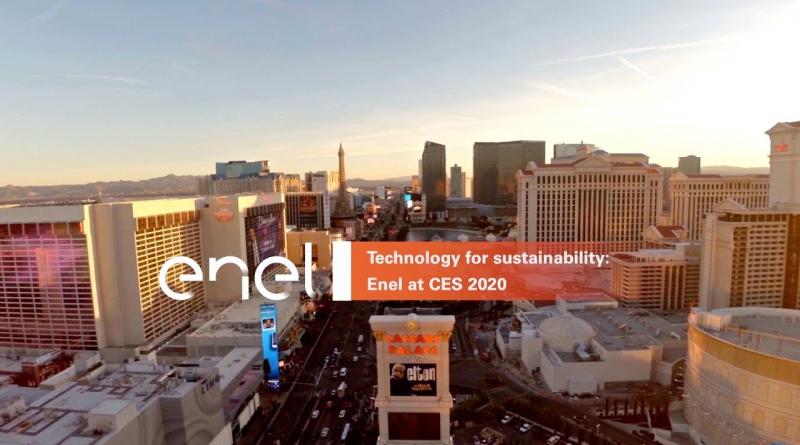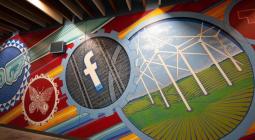Enel at CES® 2020: Tech for good.

As a global energy company with sustainability at the core of everything we do, we at Enel wanted to use our first time at the annual Consumer Electronics Show (CES) in Las Vegas to showcase technologies that underline our commitment to the energy revolution that’s happening through digitalisation and the Circular Economy. From our best-selling electric vehicle chargers to Homix, our new integrated smart home system, Enel’s innovative solutions are powering sustainable possibilities for homes, transportation, businesses, and cities.
The CES has for decades offered a glimpse of the innovative technologies that will shortly be in consumers’ homes. As environmental concerns grow across the world, however, the conference is increasingly emphasising the ways companies are using technology to build a more sustainable future. In tune with that theme, we brought startups e-Labos and WeAr with us to CES as examples of successful partnerships in which we help innovators bring their visions to life.
Throughout the week (January 6-9), we welcomed startup organisations to our booth to meet with our Innovability team, which in recent years has brought to life 50 projects that will help us move towards sustainability and the Circular Economy.
“Enel is the most innovative energy company and we look for innovation in everything we do. Innovation is extremely pervasive in all our business and in this journey it is very important to connect with startups which are innovative themselves because the co-creation of solutions makes innovation more available for us and also creates an opportunity for them to scale up to a global level”
– Fabio Tentori, Head of Enel Innovation Hubs and Startup initiatives
Technology means sustainability
Studies show that consumers prefer sustainable brands, and the number of companies displaying eco-friendly products at CES demonstrated that brands are listening. Salesforce and Unilever CEOs Marc Benioff and Alan Jope talked about the importance of sustainable business practices in a keynote session on the first day of the conference, where they stressed that sustainability is critical to businesses’ long-term success.
The growing contingent of companies displaying products that tackle environmental challenges is a testament to increased demand for sustainable products across a number of industries. The automotive pavilion was full to bursting with electric vehicles and EV technology, ranging from electric scooters to electric helicopters. Enel X unveiled its next generation of charging stations for North America at CES, including its level 2 smart charging stations that can charge EVs up to 14 times faster than standard level 1 chargers.
As city populations grow, governments are looking for ways to digitise to improve quality of life for residents and visitors. A simple but significant component is public lighting, which is fundamental to creating safe roads but also presents significant cost savings potential. By leveraging smart public lighting systems, governments can monitor their energy consumption to reduce pollution, improve performance, and save money.
“Tech for good” was a key theme at CES, and Enel’s JuiceAbility, the product of a collaboration with a startup called Avanchair, is the perfect example of technology that is sustainable while also improving lives. JuiceAbility is Enel’s smart charging system for electric wheelchairs comprising a smart cable and app that allow individuals with disabilities to connect their wheelchairs to any EV charging system equipped with a type 3A plug to charge their wheelchairs while on the go, and demonstrates that we can build a sustainable future that is accessible to all.
Consumers are taking sustainability into their own hands
Smarter homes, capable of saving energy and offering greater wellbeing, are increasingly in demand. According to a study by Mordor Intelligence, nearly 30 million U.S. households are projected to add smart home technology- by way of connected cameras, video doorbells, and connected lightbulbs, for example - in the near future.
Voice tech remained popular at this year’s CES, where companies presented Alexa-equipped beds, digitised garage door openers, and even smart toilets. While smart homes are the way of the future, however, the majority of services and devices in the market are fragmented and unsecure. In an effort to increase compatibility and adoption of smart home products, Amazon, Apple, Google, and the Zigbee Alliance recently announced a new initiative called Project Connected Home over IP. The goal of this ambitious project is to develop a universal standard for smart home devices, which in turn will give consumers the confidence that a new device will integrate with their existing cloud-based services, meaning they will be more likely to accept new technologies.
With guaranteed compatibility, consumers will increasingly adopt smart home devices such as Homix. Currently available in Italy and Spain, Homix is a smart thermostat with Amazon’s Alexa built in. This helps families save energy by making the management of heating, security, and lighting easier than ever before.
Innovation is key to tackling climate change
This year saw a substantial increase in the number of startups showcasing their sustainability solutions. Many of these startups embody Enel’s concept of innovability: the joining of innovation and sustainability to power the energy revolution. These principles are at the heart of our business strategy and have inspired us to launch open challenges in an effort to crowdsource the solutions and products that will transform the energy sector. From improving renewable power generation to preventing illegal connections to underground cables, our challenges have engaged innovators globally for more than three years.
“When you launch a startup organization you have a lot of great ideas. To transform these ideas into real products, however, you need an industrial partner like Enel. By working together, we help Enel to speed up internal processes that come with being a large enterprise, and Enel in return helps us to focus our ideas and try our software in real life situations”
At Enel, we recognise that we can’t tackle global warming alone – we believe that collaboration and innovation are integral elements in the fight. We have launched 250 projects with startups around the world and established a network of 10 innovation hubs to develop the technology that will speed up the energy revolution.
Energy impacts all parts of consumers’ lives, from their homes to their businesses, and more than 85% of energy globally is produced by fossil fuels. At Enel, we believe that the only way forward is to provide integrated solutions that help consumers and businesses to take ownership of their energy consumption. If CES 2020 was a prediction of what to expect of the next decade, the next 10 years could be a significant turning point in the global battle to stabilise the climate.
22 January 2020
enel




